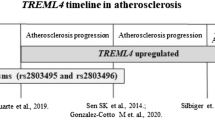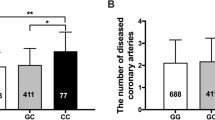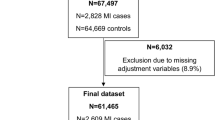Abstract
Chlamydia pneumoniae uses peripheral blood monocytes (PBMC) for systemic dissemination and has been linked to atherogenesis by inflammation mediated via TLR2/4 and CD14. We found 12.8% of 610 coronary artery disease (CAD) patients of Central European background to be chronically infected with C. pneumoniae based on the repeated detection of chlamydial DNA in PBMC. Among those the −159C>T CD14 promoter polymorphism was more frequent (OR 1.7, 95% CI 1.08–2.65, P=0.0224) than among C. pneumoniae-negative subjects matched for age and gender. The Arg753Gln TLR2 and Asp299Gly TLR4 polymorphisms were not related to chlamydial infection. Susceptibility for chronic chlamydial infection of PBMC in CAD patients appears associated with the CD14-159C>T promoter polymorphism encoding for enhanced CD14 expression.
This is a preview of subscription content, access via your institution
Access options
Subscribe to this journal
Receive 6 digital issues and online access to articles
$119.00 per year
only $19.83 per issue
Buy this article
- Purchase on Springer Link
- Instant access to full article PDF
Prices may be subject to local taxes which are calculated during checkout
Similar content being viewed by others
References
Prasad A, Zhu J, Halcox JPJ, Waclawiw MA, Epstein SE, Quyyumi AA . Predisposition to atherosclerosis by infections: role of endothelial dysfunction. Circulation 2002; 106: 184–190.
Gieffers J, Füllgraf H, Klinger M et al. Chlamydia pneumoniae infection in circulating human monocytes is refractory to antibiotic treatment. Circulation 2001; 103: 351–356.
Coombes BK, Mahony JB . Identification of MEK- and phosphoinositide 3-kinase-dependent signalling as essential events during Chlamydia pneumoniae invasion of HEp2 cells. Cell Microbiol 2002; 4: 447–460.
Bulut Y, Faure E, Thomas L et al. Chlamydial heat shock protein 60 activates macrophages and endothelial cells through Toll-like receptor 4 and MD2 in a MyD88-dependet pathway. J Immunol 2002; 168: 1435–1440.
Netea MG, Kullberg BJ, Galama JM, Stalenhoef AF, Dinarello CA, Van der Meer JW . Non-LPS components of Chlamydia pneumoniae stimulate cytokine production through Toll-like receptor 2-dependent pathways. Eur J Immunol 2002; 32: 1188–1195.
Kol A, Lichtman AH, Finberg RW, Libby P, Kurt-Jones EA . Cutting edge: heat shock protein (HSP) 60 activates the innate immune response: CD14 is an essential receptor for HSP60 activation of mononuclear cells. J Immunol 2000; 164: 13–17.
Unkelbach K, Gardemann A, Kostrzewa M, Philipp M, Tillmanns H, Haberbosch W . A new promoter polymorphism in the gene of lipopolysaccharide receptor CD14 is associated with expired myocardial infarction in patients with low atherosclerotic risk profile. Arterioscler Thromb Vasc Biol 1999; 19: 932–938.
LeVan TD, Bloom JW, Bailey TJ et al. A common single nucleotide polymorphism in the CD14 promoter decrease the affinity of Sp protein binding and enhances transcriptional activity. J Immunol 2001; 167: 5838–5844.
Lorenz E, Mira JP, Cornish KL, Arbour NC, Schwartz DA . A novel polymorphism in the toll-like receptor 2 gene and its potential association with staphylococcal infection. Infect Immun 2000; 68: 6398–6401.
Agnese DM, Calvano JE, Hahm SJ et al. Human toll-like receptor 4 mutations but not CD14 polymorphisms are associated with an increased risk of Gram-negative infections. J Infect Dis 2002; 186: 1522–1525.
Hamann L, Hamprecht A, Gomma A, Schumann RR . Rapid and inexpensive real-time PCR for genotyping functional polymorphisms within the Toll-like receptor -2, -4, and -9 genes. J Immunol Methods 2004; 285: 281–291.
Andonegui G, Goyert SM, Kubes P . Lipopolysaccharide-induced leucocyte-endothelial cell interactions: a role for CD14 versus toll-like receptor 4 within microvessels. J Immunol 2002; 169: 2111–2119.
Eng HL, Chen CH, Kuo CC, Wu JS, Wang CH, Lin TM . Association of CD14 promoter gene polymorphism and Chlamydia pneumoniae infection. J Infect Dis 2003; 188: 90–97.
Dowell SF, Peeling RW, Boman J et al. Standardizing Chlamydia pneumoniae assays: recommendations from the Centers for Disease Control and Prevention (USA) and the Laboratory Centre for Disease Control (Canada). Clin Infect Dis 2001; 33: 492–503.
Schroder NW, Hermann C, Hamann L, Gobel UB, Hartung T, Schumann RR . High frequency of polymorphism Arg753Gln of the Toll-like receptor-2 gene detected by a novel allele-specific PCR. J Mol Med 2003; 81: 368–372.
Read RC, Pullin J, Gregory S et al. A functional polymorphism of toll-like receptor 4 is not associated with likelihood or severity of meningococcal disease. J Infect Dis 2001; 184: 640–642.
Erridge C, Stewart J, Poxton IR . Monocytes heterozygous for the Asp299Gly and Thr399Ile mutations in the Toll-like receptor 4 gene show no deficit in lipopolysaccharide signalling. J Exp Med 2003; 197: 1787–1791.
Acknowledgements
This study was supported by a grant from the Deutsche Forschungsgemeinschaft (SFB 367/B11 and SPP1130). We gratefully thank T Luedemann, A Hellberg and A. Gravenhorst (University of Luebeck) for technical assistance and A Kleensang (Institute of Medical Biometry and Statistics, University of Luebeck) for his support in data analysis.
Author information
Authors and Affiliations
Corresponding author
Rights and permissions
About this article
Cite this article
Rupp, J., Goepel, W., Kramme, E. et al. CD14 promoter polymorphism −159C>T is associated with susceptibility to chronic Chlamydia pneumoniae infection in peripheral blood monocytes. Genes Immun 5, 435–438 (2004). https://doi.org/10.1038/sj.gene.6364112
Received:
Revised:
Accepted:
Published:
Issue Date:
DOI: https://doi.org/10.1038/sj.gene.6364112
Keywords
This article is cited by
-
Genetic analysis of susceptibility to Chlamydia trachomatis in mouse
Genes & Immunity (2006)



